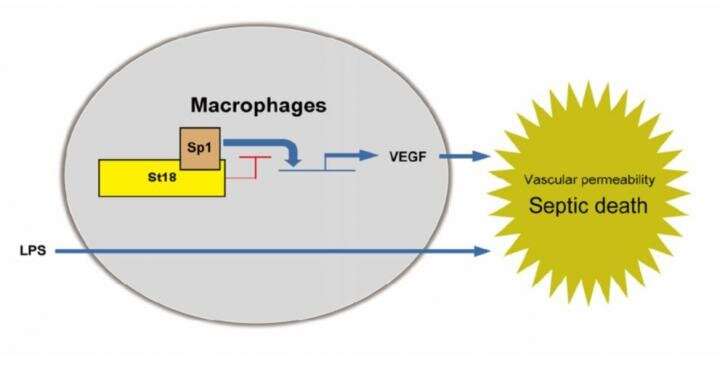
Pro-inflammatory cytokines and pathogen-associated molecular patterns such as lipopolysaccharide (LPS) are known to activate NF-kB. NF-kB is a master regulator of inflammation and induces pro-inflammatory cytokines. Although LPS-induced pro-inflammatory cytokiens are indispensable for host defense against pathogens, dysregulated production can lead to septic shock. Septic shock is the most common cause of death in intensive care unit.
Pro-inflammatory cytokines in a systemic scale inflammatory response result in increased capillary permeability and low blood pressure. However, despite injection of anti-pro-inflammatory cytokine antibody into human septic shock, mortality rates remain high. Other than pro-inflammatory cytokines, macrophages can secrete vascular endothelial growth factor (VEGF) in response to LPS. VEGF was initially described as a stimulator of endothelial permeability. VEGF was subsequently reported to promote proliferation and survival of endothelial cells, and is now thought to be the pivotal regulator of angiogenesis and vascular leakage. Notably, VEGF exaggerates septic inflammation, and human serum VEGF level can be used as a predictor of septic prognosis. Thus, not only pro-inflammatory cytokines but also VEGF play critical roles for septic pathophysiology.
Recently, Suppression of tumorigenicity 18 (St18) was discovered as a putative regulator of pro-inflammatory cytokine signaling. St18 is also reported as a candidate tumor suppressor in human breast tumors, because its expression is significantly down regulated in these cells compared to normal breast tissues. Conversely, St18 expression is up regulated in liver cancers, indicating an oncogenic function of this gene. Despite the pleiotropic functions of St18 in cancers, little is known about its functions in myeloid lineages. Maruyama and colleagues discovered that St18 is expressed in myeloid cells.
Source: Read Full Article
